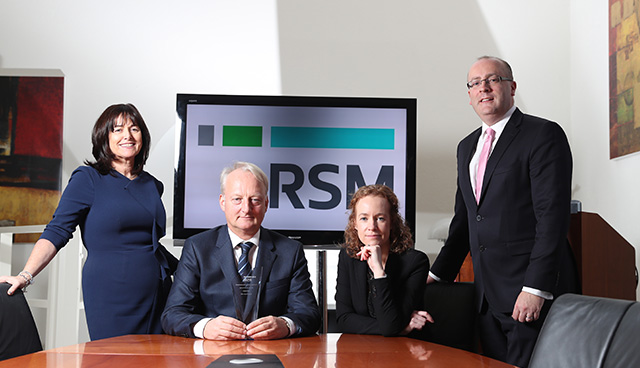Putting CSR at the core of business
 As the Government seeks to make Ireland a centre of excellence for corporate social responsibility, eolas takes a look at its first national plan.
As the Government seeks to make Ireland a centre of excellence for corporate social responsibility, eolas takes a look at its first national plan.
Back in the 2013 Action Plan for Jobs, the Government undertook to develop and publish a National Plan on Corporate Social Responsibility. The plan was published last April and a forum has been set up in order to make the most out of CSR for both businesses and wider society.
According to Enterprise Minister Richard Bruton, the new framework will make Irish businesses a much more attractive prospect both on a local and global scale.
“Ireland’s first National Plan on Corporate Social Responsibility outlines a vision for Ireland to be recognised as a centre of excellence for responsible and sustainable business practices which can benefit both enterprises and their local communities,” said Bruton. “This supports the objective of making Ireland the best small country in which to do business.”
The European Commission suggests that CSR can have a positive influence on enterprises and can bring benefits in terms of customer relations, risk management, cost savings, human resources, and improving innovation capacity and investment.
A large body of national legislation and regulation on a wide range of issues is integral to CSR and which companies already adhere to. This includes the law on employment rights, occupational health and safety, equality and human rights, consumer and environmental protection, and the payment and filing of taxes and duties. The National Standards Authority of Ireland has adopted the ISO 26000 guidance standard on social responsibility as an Irish standard.
Many enterprises are already engaging in CSR throughout Ireland in a variety of ways either on their own initiative or through formal CSR programmes run by Business in the Community Ireland and Chambers Ireland.
Whilst CSR is primarily industry-led and driven, the State has various regulatory roles relevant to social responsibility. Through the National CSR Plan, the Government aims to go beyond the legislative framework. The State can also help to raise the profile of CSR by encouraging its proliferation across all industry, irrespective of size and sector.
The plan is built on five key principles:
1. the voluntary nature of CSR (yet embedded in core business operations);
2. a shared vision of CSR;
3. CSR being accessible to all;
4. a multi-dimensional and holistic approach to CSR; and
5. a regular review process.
The European Commission promotes CSR as a voluntary approach used by businesses to meet their responsibilities for their impacts on society. This allows businesses to go beyond their statutory requirements and integrate social, environmental, ethical, human rights, equality and consumer issues into their core strategy.
The shared vision and understanding of CSR should be flexible enough to be adapted across all enterprises from SMEs to multi-nationals. CSR should apply to organisations of all sizes and sectors. For most small and medium-sized enterprises, CSR is likely to remain informal and intuitive, whereas larger enterprises may have dedicated resources.
Similarly to the core objectives of ISO 26000, there are five defined pillars in the national plan, providing a framework for the coherent analysis of CSR practices across enterprises and the public sector.
Appropriate review and consultation mechanisms will be provided and appropriate voluntary metrics for measuring the prevalence of CSR in businesses will also be explored. In addition to ongoing referencing against international developments, the national plan will be formally reviewed every three years i.e. firstly in 2016.
A CSR stakeholder forum has been established by the Government, comprising representatives from the business, public and community sectors. This forum is convened by the Department of Jobs, Enterprise and Innovation.
Pillars
Five key ‘pillars’ are outlined in the plan, some of which incorporate legislative or other regulatory requirements, whilst others are sector-specific. However, the main focus is on those areas where companies can go beyond their statutory requirements.
The workplace pillar looks at conditions of employment, equality and diversity, work-life balance, employee health and well-being, and consultation and communication.
A wide range of national and EU legislation guides the CSR workplace pillar. There are also many examples of companies which provide a wide range of innovative best practice CSR initiatives for their employees. The State is active in this area through a variety of instruments, including legislation, the provision of information, regulation and its own role as an employer.
The environment pillar focuses on resource efficiency, environmental protection, climate change mitigation and respect for biodiversity. This pillar focuses on two aspects: macro-level and enterprise-level benefits. Key drivers in this area include emissions reduction targets, renewable energy targets (for electricity, transport and heating), energy efficiency targets, increasing fossil fuel prices, environmental legislation and consumer preferences.
Production quality and information, customer relations, sustainable supply chains and fair operating practices are the key components of the marketplace pillar.
Buying and selling products is a core part of business. Ensuring that this is done in an ethical and sustainable manner is key to a company’s reputation and long-term viability. Fair operating practices where transparency and trust are fostered enable an enterprise to manage risk and future-proof its goods or services.
The community pillar covers social enterprise and entrepreneurship, employment creation and skills development, community engagement, social inclusion, employee involvement and philanthropy and sponsorship.
CSR in the community can go from financial support through to empowering and fostering partnerships for social inclusion. There is already much activity under way in this realm but there is further scope which can be linked to national policies and priorities e.g. creating jobs and making businesses more profitable.
In terms of the public sector pillar, the key areas are being a CSR exemplar, a supporting and promoting role, and regulation. The public sector has a dual role in CSR. All public bodies exist to provide a service to the public and/or communities. The public sector can support CSR through a variety of mechanisms as much of the State’s regulation underpins its principles.
Given the principle of voluntarism which underpins CSR, fulfilling these objectives can best be achieved through a collaborative approach between the state sector, enterprises and other key stakeholders. In addition to the regular review, the plan will be monitored on an ongoing basis by the CSR stakeholder forum. It will also be subject to peer review at EU level to ensure it continues to meet the needs of those involved.
Objectives
• increase awareness of CSR and its value
• encourage enterprises to develop and implement CSR policies and practices
• encourage more small and medium-sized enterprises to build CSR activity
• increase transparency and reporting of CSR activity
• anchor CSR practices in public bodies





